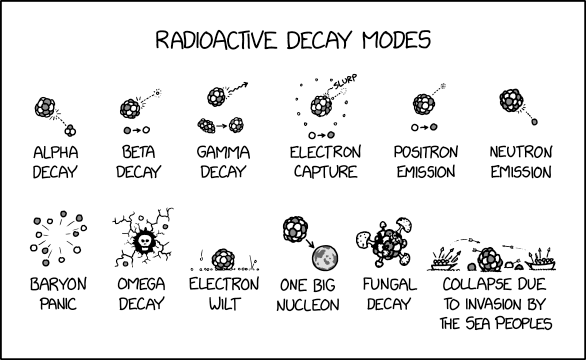#2860: Decay Modes
Permalink
Transcript
Radioactive Decay Modes
[A 6x2 table of illustrations of atoms, depicting types of atomic decay, with a label underneath.]
[First row]
[A small group of 2 protons and 2 neutrons are shown leaving a larger nucleus.]
Alpha decay
[A small particle is ejected from the nucleus while a neutron is shown converting to a proton as indicated by a shaded circle becoming white.]
Beta decay
[A nucleus emits a wavy arrow representing a wave, while a diagram shows the nucleus changing from a ellipsoid shape to a more spherical one.]
Gamma decay
[A nucleus absorbs one of its electrons along with a small sound effect.]
Electron capture
Nucleus: Slurp
[A small particle is ejected from the nucleus while a proton is shown converting to a neutron as indicated by a white circle becoming shaded.]
Positron emission
[A shaded particle is ejected from the nucleus.]
Neutron emission
[Second row]
[All protons and neutrons are ejected from the nucleus, leaving behind an empty space.]
Baryonic panic
[A few protons and neutrons are floating around a black "hole", with branching cracks coming out from it. Inside the hole is a stylized skull.]
Omega decay
[The nucleus and all the atoms has fallen to the floor, with one still falling and another bouncing off.]
Electron wilt
[A normal nucleus has an arrow pointing from it to a large, light grey sphere with dark grey patches.]
One big nucleon
[The nucleus has six white mushrooms of various sizes growing out of it, with some of the protons and neutrons being black and rotted.]
Fungal decay
[The nucleus is shown being attacked on both sides by Cueballs in boats, holding spears and firing arrows. They are all floating in water, as well as a few fallen protons and neutrons, one with an arrow sticking out of it.]
Collapse due to invasion by sea peoples.
(Sourced from explainxkcd.com)
Title text:Unlike an Iron Age collapse, a Bronze Age collapse releases energy, since copper and tin are past the iron peak on the curve of binding energy.